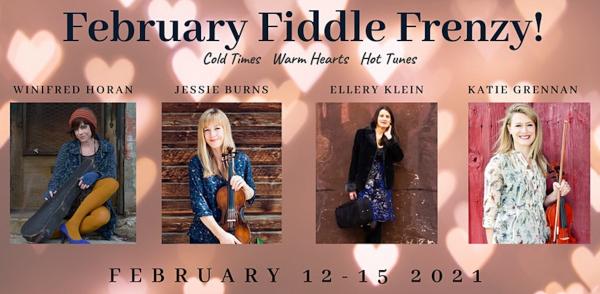February 1, 2021

Boston-area resident Ellery Klein is among the co-organizers and teachers/mentors of the February Fiddle Frenzy. "We felt it was important to not just pretend everything was normal, and that this was a normal ‘fiddle camp.’ We needed to reach out and make a weekend not just for musicians, but for human beings.”
When the coronavirus took hold last spring and intensified the transition of live music from physical venues to the Internet, the inherent message was of a hopefully temporary inconvenience: We’re sorry we can’t be together in person, but perhaps in another few months things will return to normal. As the pandemic has dragged on, however, the music community – Celtic and otherwise – has acknowledged that “normal” will likely mean something significantly different than in the past. It’s also become increasingly apparent that COVID-19 – in combination with other troubling, anxiety-producing occurrences on a national scale – has not only had a devastating widespread economic impact, but also a highly personal and individualized one, including on musicians of all stripes.
Which brings us to the inaugural February Fiddle Frenzy, an online, interactive event taking place Feb. 12-15, whose organizers include Boston-area musician Ellery Klein, a former member of popular Celtic folk-rock band Gaelic Storm. The Fiddle Frenzy will feature Zoom workshops for fiddle players of all levels, beginner to advanced, and covering Irish, French Canadian, Scandinavian, and American traditions. Joining Klein on the Frenzy teaching staff will be Winifred Horan, formerly of Solas; current Gaelic Storm member Katie Grennan; and Jessie Burns, another Gaelic Storm alumna and founder of traditional Irish group Take Down the Door; Klein, Grennan, and Burns have their own trio, The Bow Tides.
While the Frenzy will focus on standard elements of fiddling – bowing, rhythm, ornamentation, coming up with variations, improving tone, playing by ear and composing – the four co-leaders also will hold discussions on the emotional as well as practical aspects of musical involvement: not only practice techniques and navigating the music business, but also handling nervousness, discouragement, and difficulties in progressing.
There’s ample reason for this, Klein explains: “As teachers – and ‘grounded’ performers – during the pandemic, we have been feeling the effects of the ongoing national, multifaceted tragedies around us. We felt it was important to not just pretend everything was normal, and that this was a normal ‘fiddle camp’; we needed to reach out and make a weekend not just for musicians, but for human beings.
“So, besides teaching the usual skills, we wanted to make space for, and shine a light on, the many emotional reactions that we have all been having: depression, loneliness, lack of motivation. It’s often hard to practice when so many tangible rewards like performing, and playing with others at a session, have been removed.”
Klein, who also plays in the trio Fódhla, has found the past year challenging – not simply in terms of lost gigs but in adapting to remote teaching.
“My teaching has always been about building and fostering live, in-person community and teaching students to find enjoyment and connection in a skill without any need for technology. I love house concerts! Clearly, this year has made all this much harder as my student workshops, lessons, and concerts have all gone onto Zoom. I can’t say that I am not eagerly waiting the day when I can hear the sound of 20 fiddlers playing together again with me, or that I don’t have days where I just feel sad about how the past year has gone.”
Although a self-confessed “Luddite,” Klein says she has tried to make her way in this new, unfamiliar terrain and improve as both musician and teacher. “I’ve been working especially on maintaining enthusiasm and hope in myself and my students, as well as knowing when it’s time to just feel that, you know, this is hard. I definitely see my students, and me, getting tired as this drags on. I keep working to find new ways to make them feel successful and happy to play their instrument. My hope is to take some of these new skills with me into whatever’s next.”
Klein points to the Frenzy’s slogan, “Cold Times, Warm Hearts, Hot Tunes!” as a succinct statement of its goals. “We want students to leave not only with some new tunes and musical skills, but also having been seen, connected with others, and acknowledged and talked through our difficulties – and as a result, to all lift each other up: students and faculty both.”
For more about the February Fiddle Frenzy, see
eventbrite.com/e/february-fiddle-frenzy-2021-registration-132830957971?aff=erelexpmlt

